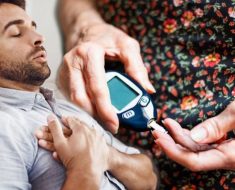Gastroesophageal Reflux Disease (GERD) is a condition where stomach contents passes backwards into the esophagus (throat), causing symptoms such as belching, bloating and nausea after eating. Usually, the lower esophageal sphincter prevents this from happening, but when this sphincter is put under pressure and partially digested food and stomach acid floods into your throat, it causes a burning sensation.
Foods, such as onion and garlic, and drinks like alcohol, coffee and fizzy beverages can cause or exacerbate symptoms of GERD and acidic foods, including citrus fruits, can make the conditions of the stomach more acidic.
But what causes GERD, and what symptoms should you look out for? We’ve spoken to the experts to find out, including ways to treat this condition.
What is GERD (acid reflux)?
GERD is characterized by frequent bouts of heartburn, regurgitation of food or stomach acid, and sometimes chest pain and nausea. Those who are overweight or obese, smokers and pregnant women are more likely to experience GERD symptoms, and they can sometimes occur as a side affect from medication.
Kim Plaza, a nutritionist for Bio-Kult, explains that for a number of people there is a reliance on antacids to control their heartburn, but that these don’t cure the underlying condition. “Many people use medications, such as antacids, that neutralize stomach acid – or medications to reduce stomach acid (known as histamine blockers) – for symptom relief but these won’t heal an inflamed esophagus that has been damaged by stomach acid,” she says. “Others may be prescribed proton pump inhibitors, which are stronger acid blockers and allow time for the damaged esophageal tissue to heal. Occasionally, doctors will recommend surgery.”
What causes GERD?
A high fat intake, coffee consumption, chocolate, spicy foods and alcohol all increase incidents of reflux, although there is less data around fried food or carbonated beverages and their links to GERD, according to research in the journal of Current Medicinal Chemistry (opens in new tab).
Dr Deborah Lee, MD, from Dr Fox Online Pharmacy (opens in new tab), tells us there is a strong link between obesity and GERD symptoms. “Obesity is such a potent cause of reflux that assisting significant weight loss, and enabling the weight loss to be maintained, has positive benefits in reducing reflux symptoms,” she says.
Dr Deborah Lee, MD
Medical Doctor
Having worked for many years in the NHS, initially as a GP, and then as Lead Clinician for an integrated Community Sexual Health Service, Dr Deborah Lee now works as a health and medical writer, with an emphasis on women’s health. She is a menopause specialist.
Lee also says that spicy foods can cause GERD symptoms, due to a natural Capsaicin Receptor Agonist found in chillis. “Research in the journal Nutrients (opens in new tab) has shown that capsaicin reduces gastric contractility and increases gastric distension in the proximal part of the stomach,” she says. “Patients with reflux have a greater number of TRPV1 receptors in the stomach than those without reflux. These are specific receptors, which transmit the sensation of a burning pain.”
GERD: Symptoms
GERD symptoms are experienced by 14-20% of American adults, making it a common issue.
“Among them is a burning sensation in the chest and throat, often with bloating, belching and feeling sick, after meals,” says Lee. “Although for many these symptoms are troublesome, in some cases they can have serious consequences, such as oesophagitis, ulcers, aspiration pneumonia and Barrett’s esophagus – a condition that results from inflammation and scarring due to excess acid, narrowing the esophagus.”
Plaza lists her top ‘red flag’ symptoms for GERD:
- A burning sensation in the chest (also known as heartburn): it usually occurs after eating and may be worse at night or while lying down
- Regurgitation of food or sour liquid
- Upper abdominal or chest pain
- Dysphagia (difficulty swallowing)
- The feeling of a lump in the throat
GERD vs heartburn
GERD differs from occasional heartburn due to the frequency of symptoms. GERD symptoms occur 2-3 times a week, or more, and often at night. Heartburn is experienced infrequently by most people at some point in their lives. Heartburn becomes classified as a disease when the symptoms are frequent and there is the possibility of them causing long-term damage. Then, your doctor will likely want to carry out tests to reach a diagnosis.
GERD: Diagnosis and testing
GERD is generally diagnosed with an upper gastrointestinal tract (GI) endoscopy, where a small camera is sent down the esophagus to investigate the lining of the stomach and up the GI tract. A small wireless capsule may be left in your esophagus to monitor your esophageal pH, or this can also be monitored with a catheter inserted through the nasal passage.
An Expert Review of Gastroenterology and Hepatology (opens in new tab) analysis indicates that a hiatal hernia, which is sometimes found during the endoscopic investigations, can be another risk factor that increases incidents of GERD. The entrance of the esophagus is abnormally shaped or misplaced in the thoracic cavity when one has a hiatal hernia, causing stomach acid to get trapped above the diaphragm.
How can you treat GERD?
The most effective treatments for GERD include lifestyle changes, as well as the use of proton pump inhibitors and laparoscopic fundoplication (a keyhole procedure), according to a review in the JAMA Surgery (opens in new tab) journal. Endoscopic treatments have been shown to be less effective.
Diet in particular is an effective way to control GERD, with dietary changes listed as first-line treatment in the journal of Current Opinion in Gastroenterology. (opens in new tab)The review indicates that nonpharmacological therapies, such as dietary management, are currently considered the best way to manage GERD and should be tried before considering pharmaceuticals or surgery.
Lee explains that research has shown that probiotics can be helpful in the management of GERD symptoms. “A 2020 review and meta-analysis in Nutrients (opens in new tab) journal, which included 13 studies, concluded that probiotics were useful and could improve acid reflux symptoms,” she says. “However, these were all observational studies, and there were no randomized controlled trials – the gold standard. The research suggested that probiotics might be especially useful for reducing regurgitation and the sensation of heartburn.”
This article is for informational purposes only and is not meant to offer medical advice.
Additional resources
- Learn about the symptoms people with GERD experience (opens in new tab), according to the University of Southern California Keck School of Medicine.
- Read about how GERD presents itself in children (opens in new tab), according to the NIH.
Lou Mudge
Health Writer
Lou Mudge is a health writer based in Bath, United Kingdom for Future PLC. She holds an undergraduate degree in creative writing from Bath Spa University, and her work has appeared in Live Science, Tom’s Guide, Fit & Well, Coach, T3, and Tech Radar, among others. She regularly writes about health and fitness-related topics such as air quality, gut health, diet and nutrition and the impacts these things have on our lives.
She has worked for the University of Bath on a chemistry research project and produced a short book in collaboration with the department of education at Bath Spa University.
Source: Read Full Article






